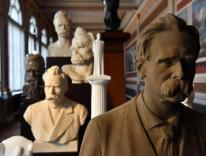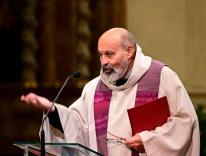My auto mechanic, Maynard, has a lesson to teach us about the unfortunate dispute between the U.S. bishops and the Catholic organizations that support the health-care law enacted last March.
The lesson applies not to the substance of the bishops’ negative conclusion on the health-care bill, but to the level of certainty the bishops have claimed for their judgment. It is this latter issue that has been most divisive. Certain bishops, completely confident of their position, have punished Catholic individuals and organizations that reached a different conclusion about what the Affordable Care Act allows and how it will be interpreted by the courts. Some observers, such as Richard Gaillardetz (see “The Limits of Authority,” August 13, 2010), have raised important questions pertaining to the authority of bishops and the role of prudence in any episcopal intervention in public life.
Meanwhile, many of us professional theologians have wondered how a man as intelligent and well educated as Cardinal Francis George, president of the United States Conference of Catholic Bishops and spokesman for the conference when the health-care bill was passed, could fail to recognize the unavoidable role of prudence in the bishops’ negative judgment of the final bill.
Cardinal George explained his position in his presidential address at the November 2010 USCCB meeting. He said the bishops had faced an “empirical” question concerning whether the legislation permitted “the funding of abortions beyond the restrictions imposed by the Hyde amendment.” He added that “laypeople who carefully analyzed the contents of the legislation…freed us, the bishops, to make the necessary moral judgments.” Their moral judgment was that, since the USCCB’s lay experts found that the legislation allowed abortion funding not already permitted by the Hyde Amendment, the bishops should oppose it. But the bishops conference went further than this, insisting that all Catholics must agree with them: there could be no responsible Catholic endorsement of the final bill.
Cardinal George spoke of people who “protested that the legislation is complicated and we therefore shouldn’t pretend to judge it.” (I know of no one in the Catholic debate who argued that the bishops should not judge such legislation.) The cardinal continued, “If you will excuse my saying so, this implies either that no one can understand or judge complicated pieces of legislation, in which case it is immoral to act until sufficient clarity is obtained, or it is to say that only bishops are too dense to understand complicated pieces of legislation.”
In Cardinal George’s view, there are two distinct judgments that had to be made. The first was legal, the second moral; and the second was based on the first. The moral conclusion could not be certain unless its legal premise was also certain. If there was any room for disagreement about the USCCB lawyers’ legal opinion, there must also be room for disagreement about the bishops’ moral judgment—and, of course, a number of legal scholars have disagreed with the USCCB lawyers.
Cardinal George’s argument was later supplemented by a statement written by USCCB staff theologian Fr. Thomas Weinandy. Titled “The Bishops and the Right Exercise of Authority,” this statement responded to Gaillardetz’s Commonweal article and defended the bishops’ final position on the Affordable Care Act. Weinandy argued that the bishops conference acted within its authority when it insisted “that all Catholics and organizations that reside under the Catholic umbrella must agree with its analysis.”
Cardinal George’s description of the legal question as “empirical” may explain why he could erroneously consider such an analysis certain. One might believe, mistakenly, that because a judgment is empirical, it must also be certain. In this view, all empirical issues are like those faced by the scientist explaining everyday events. How does an internal combustion engine work? The scientist can explain with great precision the conditions under which a vapor of gasoline and oxygen will explode inside a cylinder with sufficient force to push the piston away, thus propelling a drive train that carries this power to the wheels of the car. Since this type of empirical issue can be mastered by intelligence and study, and certainty is available even to a nonspecialist, this seems to be the sort of empirical issue Cardinal George has in mind. But what about the judgment of the USCCB’s legal counsel, which the bishops apparently take to be certain? Law-school students may learn many precise definitions, but an attorney is more like an auto mechanic than a scientist.
This is where my mechanic, Maynard, enters the picture. When I take my car into the shop because there is a knocking in the engine, my concern is indeed empirical: What’s wrong and what’s needed to fix it? Maynard and I must make a decision based on a preliminary judgment about the cause of the knocking. He knows that there are several potential causes of engine knock, some of them simple and cheap to fix, others more complicated and quite expensive. My hope, of course, is to fix a simple problem. But I recognize that I would be wasting my money to fix a nonexistent simple problem if I will eventually need to pay for the more complicated solution. That’s where Maynard’s wisdom comes in. I trust him.
The fact that Maynard’s judgment is superior to mine is not evidence of any lack of intelligence on my part. My ability to understand engines is nearly irrelevant. I would guess that both Cardinal George and I would defer to the mechanic’s judgment about where to start, even though the mechanic, too, will have to guess about which of the possible problems is actually causing the knock. No guess is certain, but his will be better than ours. I could spend the next two months studying gasoline engines and still wisely decide to defer to Maynard’s judgment, which is based on years of experience. But even his well-informed judgment carries no assurance of certainty.
The same thing happens when we to turn to an attorney. When we have to appear in court, the question we want answered usually won’t be “What is a tort?” or “What’s the difference between a covenant and an easement?” or even “What does this piece of legislation ‘say’?” These are things we could learn if we invested enough time. Most often what we want is far more complicated than that. We want someone with years of experience, who not only knows what the various parts of the law say but also has a highly educated judgment about how the courts will resolve the inevitably conflicting messages presented by competing laws interacting with a unique set of facts. This judgment is necessarily uncertain, which is why we call the attorney’s conclusion a “legal opinion.” We know that different attorneys may come to different conclusions about how a case ought to be decided—or how it is likely to be decided.
To remind ourselves of the complexity of such matters, we need only recall the Equal Rights Amendment, approved by Congress in 1972, which simply said, “Equality of rights under the law shall not be denied or abridged by the United States or by any state on account of sex.” This Constitutional amendment was never ratified by the states in large part because of unsettled debate about how those twenty-four words would be interpreted by federal courts. If legal experts cannot agree on the meaning and implications of twenty-four words, how likely are they to agree about all of the 400,000 words in the Affordable Care Act?
Thus Cardinal George’s empirical question of what the law entails would seem to be far more like the auto mechanic’s challenge than the scientist’s. Because human beings are more complicated than auto parts, it is far more difficult for even an experienced attorney to predict the outcomes of court cases (for that is what’s really at stake in the debate about the new law) than for Maynard to diagnose the problem within my engine.
One test of how certain the USCCB is about its legal position will come when it eventually decides whether its legal staff should even bother to submit a friend-of-the-court brief to oppose a suit by prochoice advocates trying to expand the health-care law’s federal funding of abortion beyond what is allowed by the Hyde Amendment. My guess is that the bishops’ attorneys will find grounds for resistance within the new law, and this will demonstrate, at a minimum, that a reasonable debate on the implications of the law is possible.
Cardinal George speech implies—Fr. Weinandy’s statement explicitly claims—that prudence was not involved in the bishops’ decision. Fr. Weinandy writes that “with regard to the issue of direct abortion, there is not a variety of legitimate prudential judgments. This is a matter of absolute moral prohibition.” This despite the fact that the bishops were willing to endorse the bill if its abortion-funding restrictions had been the same as those found in the Hyde Amendment, which also allow the federal government to “pay for gravely immoral actions, such as abortions” in cases of rape, incest, or to save the life of the mother. In short, the difference between the health-care bill the bishops rejected and the one they were willing to endorse was not that one funded abortions and the other didn’t. Because both allowed funding for abortion, the decisive consideration for the bishops could not have been the “absolute moral prohibition” against direct abortions.
Fr. Weinandy argues that prudence is required for a choice among “a variety of justifiable approaches.” But since the bill was judged unjustifiable, Weinandy writes, “it is no longer a question of making a prudential judgment concerning any number of possibly good actions. Now it is a judgment of whether an immoral action is being permitted and fostered.” Thus, the certainty of the bishops’ judgment depends on its being based solely on principle, without the kind of complications that prudence engages. But, again, wasn’t the line between the acceptable abortion funding permitted by Hyde and the unacceptable funding the bishops saw in the Affordable Care Act drawn with the ink of prudence?
I intend no criticism of the substance of the bishops’ conclusion. One can make a good case in Catholic moral theology for their decision to endorse a bill with federal funding for some abortions while rejecting a bill that (they believe) funds other kinds of abortion.
Because the basic moral principle that abortion is immoral cannot by itself provide a warrant for the bishops’ support of a Hyde-restricted bill, something more is needed. That something more is what Catholic moral theology calls “prudence.” Prudence, according to Thomas Aquinas, “is not about the ends, but about the means” and “applies universal principles to the particular conclusions of practical matters.” The judgment that a piece of legislation falls within the range of morally justifiable options is a practical judgment, and therefore requires prudence. And if it requires prudence to decide that a particular piece of legislation is justifiable, it also requires prudence to decide that similar legislation is unjustifiable.
Those who take a more sectarian position might have refused to endorse the compromise embodied in the Hyde restrictions out of a false sense of moral purity. But ours is a church, not a sect. The Catholic Church engages the secular world and works to transform it; it does not simply judge the world sinful and walk away. This feature of our tradition carries a price—namely, that we can’t always be certain of our judgments about complex political issues.
Judge Learned Hand once said, “Life is made up of a series of judgments on insufficient data, and if we waited to run down all our doubts, it would flow past us.” The bishops are quite responsible in refusing to let life flow past them. Unfortunately, they have been unwilling to acknowledge the uncertainties this very Catholic refusal entails. They rightly oppose abortion, and did not abuse their authority in making a practical judgment about the health-care bill. But their unwarranted claim to certainty is causing ongoing damage to the church and its mission.
Related: Devil's Advocates and Episcopal Oversight, by Timothy Stoltzfus Jost
The Limits of Authority, by Richard Gaillardetz
Catholic Unity and Crying Wolf, by the Editors
From the blog: Jost Jousts


